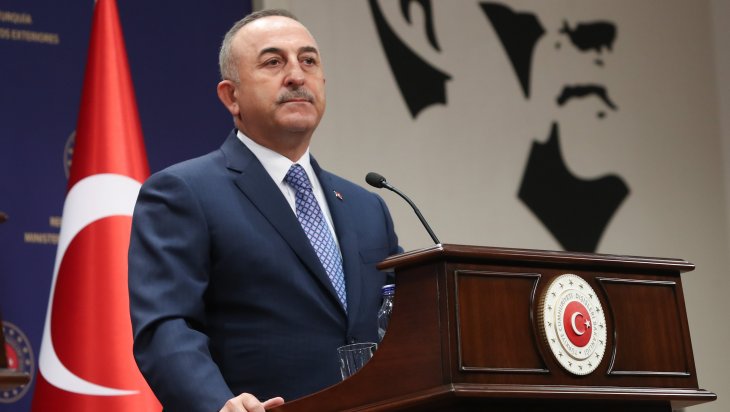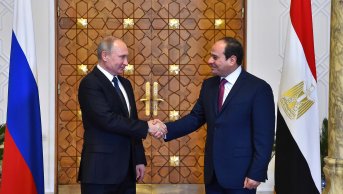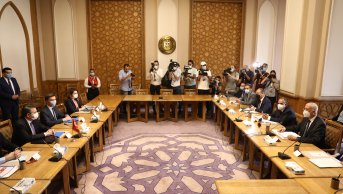The Turkish-Egyptian Rapprochement: Prospects for the Future

Following the release of numerous statements in the last couple of weeks by Turkish Foreign Minister Mevlüt Çavuşoğlu and Turkey’s Presidential Spokesperson Ibrahim Kalın regarding possible talks with Egypt on cooperation, Turkey announced the resumption of diplomatic talks with Cairo after eight years of disconnect. In a statement given to Anadolu Agency and TRT on March 12, Çavuşoğlu announced that Turkey established contacts with Egypt, both at the intelligence level and the foreign ministry level. The Turkish Foreign Minister expressed that prerequisites were not given from the Egyptian side, and that any prerequisites from the Turkish side were also not given at this moment in time. In reference to the 8-year absence of bilateral relations, Çavuşoğlu underlined the difficulty of acting as if nothing happened between the two countries when the bonds between Ankara and Cairo have been broken for years. Çavuşoğlu added that the restoration of diplomatic channels is formed by meeting slowly and determining a road map and taking steps on issues concerning both countries. In addition, the Foreign Minister highlighted the presence of a lack of trust when there has been so much disconnection, which could happen on either side. As a result, negotiations take place within the framework of a certain strategy and road map, and they continue, Çavuşoğlu stated. Although diplomatic talks have resumed, the Turkish Foreign Minister noted that he had met with his Egyptian counterpart at international meetings before, recalling that he has met with Egyptian Foreign Minister Sameh Shoukry in New York in 2019, and that contacts have taken place gradually between both parties. Turkish President Recep Tayyip Erdoğan separately commented on the subject as well, indicating Ankara’s continuation of the cooperation process with Egypt in terms of intelligence, diplomacy, and economy. The Turkish President added that although this is not conducted at the highest level, it is just below the highest level. “We wish to continue this process with Egypt in a much stronger fashion, therefore, once these talks on the intelligence and diplomatic level have yielded results, we will move them to higher levels.” said Erdoğan.
Responses from the Egyptian side to the declarations by the Turkish Foreign Minister and President came soon after in the form of a media report, and later through an official statement by the Egyptian Foreign Minister. Initially, in a statement given by an anonymous Egyptian official to the MENA News Agency on the same day, it was communicated that the resumption of diplomatic ties between Ankara and Cairo was rejected and that these relations continued to exist only at the charges d’affaires level in accordance with diplomatic norms. On the surface, this seemed similar to the negative statement given by Cairo after Turkey’s announcement of a possible agreement on maritime jurisdictions with Egypt earlier in the month. However, in contrast to the aforementioned possibilities, the Egyptian official did give signs of talks going on behind closed doors through the expression of the necessity of taking into consideration the respect of the principles of sovereignty and requirements of Arab national security, in order to upgrade the level of bilateral relations between the two countries. In addition, the official underlined Egypt’s expectations of commitment towards “the rules of international law and the principles of good neighbour policy, additionally to the halt of interference in the internal affairs of regional countries” for any country intending to establish normal relations with Cairo. Two days later, on March 14, the resumption of diplomatic talks between Turkey and Egypt was confirmed by Egyptian Foreign Minister Sameh Shoukry. Even though he expressed that dialogue between the two countries was limited, Shoukry indicated that talks have been conducted within the confines of normal diplomatic frameworks. The Egyptian Foreign Minister further underlined that, if Turkey’s statements are followed by real actions, showing the desire to align with Egypt’s principles and goals, then the fundamentals for the normalisation of ties would be established.
While recent steps taken between Turkey and Egypt provide a very strong signal for a possible partnership and normalisation of ties between Ankara and Cairo, there are questions to ask regarding the context and potential cost of this rapprochement for both sides. For Turkey, a rapprochement with Egypt would be a very crucial development in the context of energy disputes observed in the Eastern Mediterranean, where Turkey has faced a strong isolationist policy. Not only has it been left out of regional platforms, such as the East Mediterranean Gas Forum, where even the membership of France is present, which has no immediate border with the region itself, it has also been the victim of pressures attempting to deprive it of its rights in its maritime boundaries. Consequently, such a rapprochement for Ankara could, to some extent, build a platform for its rightful inclusion in regional dialogues and platforms. Elsewhere, on the bilateral level, a Turkish-Egyptian rapprochement would contribute to drawing the two largest economies in the East Mediterranean region closer together, leading to the bolstering of trade relations for the benefit of both states. Earlier this month, in line with this train of thought, Foreign Minister Çavuşoğlu spoke of the possibility of an agreement with Egypt regarding the negotiation of maritime jurisdictions, in accordance with the course of bilateral relations. This could lead to cooperation on energy for both countries, which would be in line with the policy of both countries in becoming a regional energy hub. The prospect of this seems highly likely, keeping in mind Turkey’s appreciation of Egypt’s respect for Turkish maritime boundaries. In the future, this can lay the foundation for a stronger political rapprochement.
Despite the aforementioned possibilities, it is apparent that this will most likely have a cost for Turkey, based on the two statements made by Egypt in the past few days. An important matter that could be looked at involves the softening or potential closure of media platforms affiliated with the Muslim Brotherhood in Turkey, which has been the main contributor to the tensions witnessed between the two countries, from the perspective of Egypt. Another demand Ankara may face is to backtrack from its involvement in Libya and even Syria, considering the statement expressed by the anonymous Egyptian official referring to the “halt of interference in the internal affairs of regional countries”. A third matter that could be touched upon by Cairo may be with relation to the maritime dispute between Turkey, Greece, and the Greek Cypriots, the latter two being close allies of Egypt.
To conclude, the recent developments in Turkish-Egyptian relations have created a potential path in the normalisation of bilateral ties between Ankara and Cairo. The movement of diplomatic ties towards rapprochement would certainly be a mutually beneficial act for both countries, most notably in the economic and energy sector. Additionally, it would also establish the groundwork for a deeper rapprochement in the long-term, between both sides of the Eastern Mediterranean. However, it seems likely that this will not take place immediately and not without any conditions, considering the 8-year long tensions between the two states. As Turkish Foreign Minister Mevlüt Çavuşoğlu articulated in his statement this week, the restoration of diplomatic channels is a slow process and is determined with the establishment of a road map for addressing the issues at hand.









